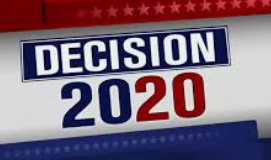Something of a death
struggle rages in Georgia as 2020 fades away and 2021 emerges. Democrats and Republicans have mobilized for runoff
elections in two U.S.
Senate races with enormous implications. Those January 5 battles
will decide control of the senate and, perhaps, the fate of much of incoming
President Joe Biden’s agenda.
The Peach State ended
up with these two
contests because its law requires that senators win a
majority of the vote, even in a general election. Nobody in either race got a
majority on November 3. Historically, Democrats don’t do well in runoff
elections in Georgia. With the allure of the presidential race gone, many
Democratic-leaning voters don’t show up. Biden’s narrow victory this year
notwithstanding, Georgia has been a red state for a long time. Republicans have
a structural advantage and much of the political community expects GOP wins in
both races. Not every factor, however, points in that direction.
The Players
In one race, 33 - year old Democrat Jon Ossoff, a London School of Economics graduate who nearly won a
congressional seat in a 2017 special election, faces incumbent Republican David Perdue for a full six - year term. Perdue,71, narrowly missed
getting a majority in the general election. He’s seeking his second senate
term.
Democrat Raphael Warnock, 51, serves as senior minister at Atlanta’s Ebenezer Baptist Church. The man who occupies Martin Luther King’s pulpit faces Senator Kelly Loeffler, 50, in the race for a two-year term. Georgia Governor Brian Kemp appointed Loeffler
earlier this year
to fill
the seat of Johnny Isakson, who resigned. Loeffler, a devoted Trump supporter, has
extensive business interests, including ownership of the Atlanta Dream of the WNBA.
Corruption charges
have dogged the Republican candidates as both have been accused of insider
stock trading. They
allegedly sold stocks based
on information received in closed-door senate
meetings earlier this year about the damage certain industries would suffer in
the coronavirus pandemic. In the current polarized political
environment, the charges haven’t gotten much traction. Democrats apparently believe
the worse about both Perdue and Loeffler and Republicans appear not to care
much. Republicans make the usual they’re-too-liberal
arguments
against Ossoff and Warnock. Again, it’s unlikely the claims make much difference. The races come down to which tribe can get its members to the
polls.
The Stakes
When it was all said
and done on November 3,
Democrats had 48 U.S. Senate seats (including two independents who
affiliate with them) and Republicans 52. If Ossoff and Warnock knock off the Georgia
incumbents, Democrats would control the senate by virtue of Vice President Kamala Harris’s tiebreaking vote. With that control, Democrats woul chair committees andDemocratic leader Chuck Schumer would control the calendar and the
ability to bring up bills. He could exercise the powers current majority leader
Mitch McConnell of Kentucky now wields so
ruthlessly.
Control of the senate will say much about Biden’s ability to
confirm cabinet and other
officials, make
judicial appointments, and fulfill campaign promises on matters like climate change
and racial equity. Biden believes he can work with Republicans, but he knows Democratic control of the senate would make
things so much easier and so much
more possible. Biden and Harris have campaigned in Georgia for Ossoff and
Warnock and one or both of them could make additional appearances before the
election.
The Campaigns
For Democrats, the
races are about turnout. If organizers like 2018 Democratic gubernatorial
nominee Stacey Abrams can approach duplicating the turnout of black,
Hispanic,
narrow win in the Asian, and young voters, especially in the fast growing, rapidly diversifying Atlanta suburbs that gave Biden his residential
race, they believe they can win the senate races, despite the structural GOP
advantages.
For a long time,
Republicans fought among themselves about these runoffs. President
Trump claimed he lost Georgia because of voter fraud, despite a
Republican governor and secretary of state. Some normal Trump allies suggested
Republican voters should stay home and skip the runoffs because the system was
rigged and their votes wouldn’t count. No evidence of that exists, of course; recounts produced thesame result as the initial tally in the presidential race. Still, some people
believe Trump and that has created massive upheaval in Republican ranks.
The GOP infighting has subsided. Some trends in the polling
have favored Perdue and Loeffler. Though both races remained statistically tied
for much of the campaign, the incumbents edged upward in later polling.
Turnout, however, could tip things toward the Democrats.
Early voting exceeded expectations and broke records for a runoff election. In
the first week, the numbers approached those of the same time frame in the general
election. No one knows if voters will sustain that pace, but that’s the goal of
Abrams and her cohorts. If they reach it, Ossoff and Warnock have a chance.
Money and campaign workers have flooded
into
the state. In races
with razor thin margins like the polls show, anything can happen. Georgia is on
the nation’s political mind and the January 5 outcome means a lot.
The tale is still to be told.
























